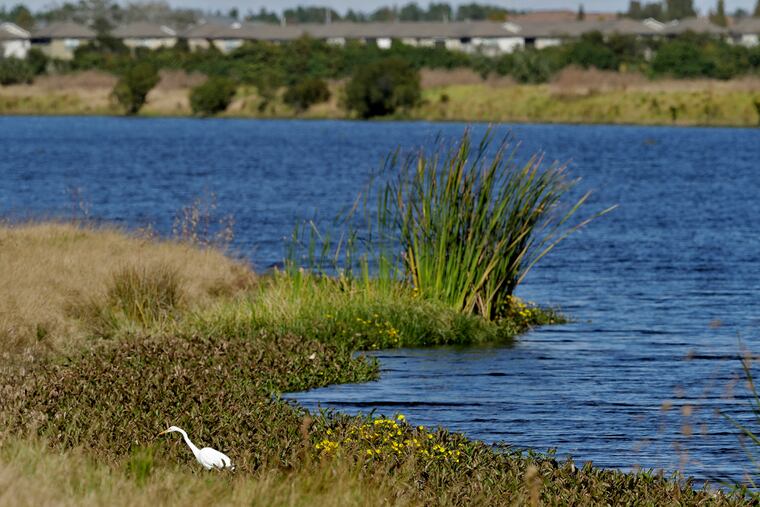Trump aims to remove waterway protections, aiding developers
The Trump administration appears ready to move ahead with its plan to remove protections for some of the nation's millions of miles of streams, wetlands and arroyos

WASHINGTON — The Trump administration is lifting protections for some of the nation’s millions of miles of streams, arroyos and wetlands, nearing completion on one of its most far-reaching environmental rollbacks.
The changes announced Thursday will scale back which waterways qualify for protection against pollution and development under the half-century-old Clean Water Act. President Donald Trump has made a priority of the rollback of clean-water protections from his first weeks in office. Trump says he is targeting federal rules and regulations that impose unnecessary burdens on businesses.
Chiefs of the Environmental Protection Agency and the U.S. Army Corps of Engineers announced the changes at a builders’ convention in Las Vegas.
“EPA and the Army are providing much needed regulatory certainty and predictability for American farmers, landowners and businesses to support the economy and accelerate critical infrastructure projects,” EPA Administrator Andrew Wheeler said in a statement.
The changes had been sought by industry, developers and farmers, but opposed by environmental advocates and public health officials. They say the changes would make it harder to maintain a clean water supply for the American public and would threaten habitat and wildlife.
THIS IS A BREAKING NEWS UPDATE: AP's earlier story follows below.
WASHINGTON (AP) — The Trump administration appears ready to move ahead with its plan to remove protections for some of the nation's millions of miles of streams, arroyos and wetlands, completing one of its most far-reaching environmental rollbacks.
The changes, promised by President Donald Trump in his first weeks in office, would sharply scale back the government’s interpretation of which waterways qualify for protection against pollution and development under the half-century-old Clean Water Act. Trump says he is targeting federal rules and regulations that impose unnecessary burdens on businesses.
An announcement on a final rule was expected as soon as Thursday.
The changes had been sought by industry, developers and farmers, but opposed by environmental advocates and public health officials. They say the changes would make it harder to maintain a clean water supply for the American public and would threaten habitat and wildlife.
The administration says the changes would allow farmers to plow their fields without fear of unintentionally straying over the banks of a federally protected dry creek, bog or ditch. But the government’s own figures show it is real estate developers and those in other nonfarm business sectors that take out the most permits for impinging on wetlands and waterways, and stand to reap the biggest regulatory and financial relief.
A draft version of the rule released earlier would end federal oversight for up to half of the nation’s wetlands, which provide buffers against flooding and climate change, and one-fifth of the country’s streams, the upstream sources of drinking water, environmental groups warned.
The rollback would be one of the most ambitious of the Trump administration''s wide-ranging cuts in federal protections on the environment and public health. While many rollback efforts have targeted regulations adopted under the Obama administration, the draft clean-water plan released earlier would lift federal protections for many waterways and wetlands that have stood for decades under the Clean Water Act.
That includes protections for creek and river beds that run only in wet seasons or after rain or snow melt — the kind of so-called ephemeral and intermittent waterways that provide the majority of water for some dry states in the West. “That’’s a huge rollback from way before Obama, before Reagan," said Blan Holman, a senior attorney with the Southern Environmental Law Center.
State officials in New Mexico have particular concerns given that the Rio Grande, which provides drinking water and irrigation supplies for millions of people in the Southwest and Mexico, depends largely on the types of intermittent streams, creeks and wetlands that could lose protection under the rule draft released earlier. The Rio Grande is one of North America’s longest rivers.
Jen Pelz, the rivers program director with the New Mexico-based environmental group WildEarth Guardians, said the Rio Grande would be hard hit.
“It defies common sense to leave unprotected the arteries of life to the desert Southwest," Pelz said.
Trump has portrayed farmers — a highly valued constituency of the Republican Party and one popular with the public — as the main beneficiaries of the rollback. He claimed farmers gathered around him wept with gratitude when he signed an order for the rollback in February 2017.
The federal protections keeping polluters and developers out of waterways and wetlands were “one of the most ridiculous” of all regulations, he told a farmer convention in 2019.
“It was a total kill on you and other businesses,” Trump said at that time.
Environmental groups, public health organizations and others say it’s impossible to keep downstream lakes, rivers and water supplies clean unless upstream waters are also regulated federally. The targeted regulations also protect wildlife and their habitats.
Associated Press writer Susan Montoya in Albuquerque, New Mexico, contributed to this report.